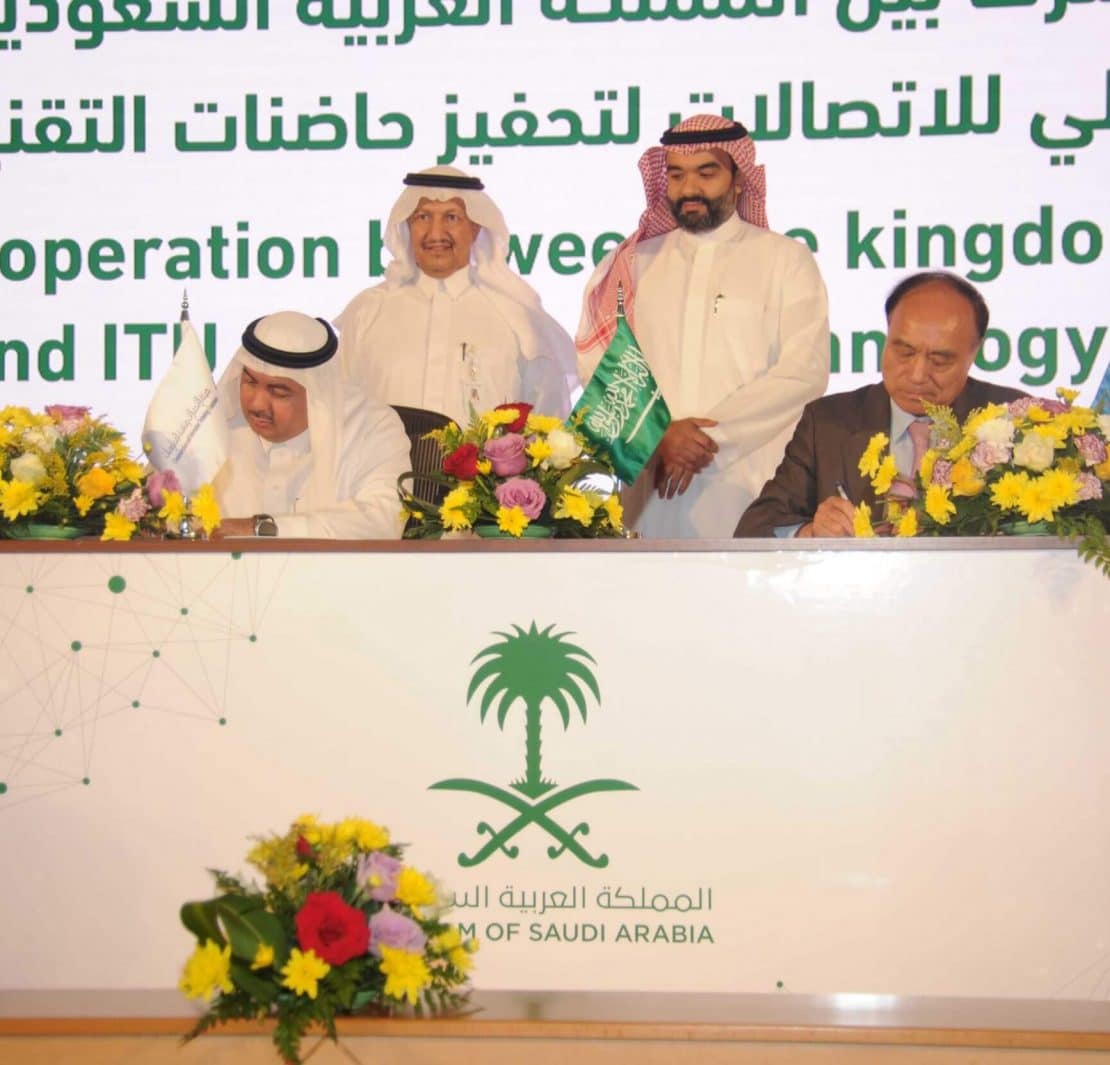King Abdulaziz City for Science and Technology (KACST), represented by Badir Program for technology incubators and accelerators, has signed a new partnership initiative with the International Telecommunication Union (ITU) today for developing several projects in the domain of innovation and entrepreneurship, empowering the digital entrepreneurship and enhancing the efforts exerted for entrepreneurs, innovators and emerging companies in the Arab world.
The agreement was signed by HRH Turki bin Saud bin Mohammed Al-Saud, the President of KACST, and Mr. Houlin Zhao, the Secretary-General of ITU. The agreement was signed at the CITC headquarters in the presence of His Excellency Eng. Abdullah Al-Swaha, Minister of Communications and Information Technology, and Dr. Abdulaziz Al-Ruwais, Governor of Communications and Information Technology Commission.
Under the said cooperation agreement, Badir Program will chair and host the annual meetings of the Arab Technology incubators and Techno Parks Network in the Arab Region (ARTECNET) for three years as from 2019 to 2021, aiming at the exchange of ideas and visions on the most successful ways to promote the Arab incubator industry, the utilization of experiences, information and experiences to improve the performance of incubators and the setting of ambitious plans and programs to improve the performance and enhance the role of emerging companies in the Arab world.
ARTECNET was set up in 2014 in Algeria, with the support of ITU, where a group of the founder members adopted this idea during the Arab Technological Cities Meeting in Tunis 2013.
Under the memorandum of understanding, Badir Program shall, in cooperation with ITU, be responsible for preparing and organizing workshops and training programs, whether on-site, via internet or through remote participation, to facilitate the exchange of experiences and scientific and practical information between the Arab business incubators, the decision-makers and the related bodies; to raise awareness and enhance the role of small, emerging and innovative companies in ICT sector; to encourage the spread of digital innovations in the Arab region; and to launch a website for the project.
Following the execution of the agreement, HRH Turki bin Saud bin Mohammed Al-Saud, the President of KACST, applauded the efforts exerted by ITU to develop ICT entrepreneurship, stating that “KACST” aspires to build, in partnership with ITU, a digital environment embracing, developing and attracting the skillful minds in digital transformation and to contribute to the support of entrepreneurship to achieve economic sustainability, entrepreneurship, and innovation at the Arab level.
The president of KACST expressed his pleasure for Badir’s chairmanship of ARTECNET and hosting of the meetings of the Network members for the first time in the Kingdom, stating “We will work to make this event an important milestone for overcoming the challenges faced by emerging companies in the Arab region. Moreover, it is also a real opportunity to meet and interact with the sector players to build and promote entrepreneurship in the Arab countries.
Mr. Houlin Zhao, the Secretary-General of ITU, also expressed his pleasure for the agreement execution, indicating that ITU seeks to build partnerships with many public and private bodies, to ensure integration, cooperation and effort consolidation for finding innovative and practical solutions to enhance the progress of small and medium enterprises and emerging businesses in the Arab countries.
He asserted that the memorandum of understanding executed with KACST will contribute to raising of competitiveness of emerging companies operating in ICT sector and enhancing their role and participation in the sustainable development and economic growth of the Arab region.
Badir Program is one of the leading programs of King Abdulaziz City for Science and Technology. The program was established in 2008 to improve and support technical entrepreneurship throughout the Kingdom by helping the strategic policy applied in entrepreneurship and incubators in collaboration with government agencies, universities and the private sector.

